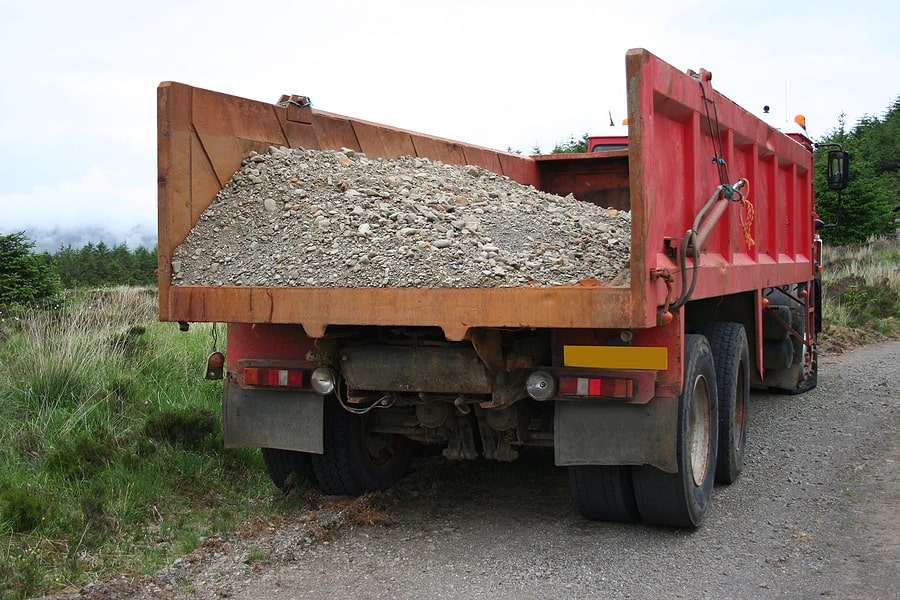Trucks hauling gravel travel the roads every day, hauling material used in the construction of roads, buildings, and utilities. We encounter gravel trucks anywhere people live, work, or are building. Often we don’t even notice them. But an accident involving a gravel truck can be catastrophic.
In this blog, we examine the dangers associated with gravel trucks and how an experienced truck accident attorney in Nevada can help if an accident with a gravel truck harms you or a loved one.
Truck accident statistics
The National Highway Traffic Safety Administration (NHTSA) classifies any vehicle with a weight rating of over 10,000 pounds to be a large truck. There are over 15 million trucks in the United States.
Every year accidents involving large trucks, including gravel trucks, kill about 5,000 people and injure about 115,000 people. According to the Pocket Guide to Large Truck and Bus Statistics, in a recent year, of the 33,654 fatal crashes on U.S. roadways, 4,630 (13.8percent) involved at least one large truck or bus. In addition, there were an estimated 6,701,000 nonfatal crashes, 555,000 (8.3 percent) of which involved at least one large truck or bus.
Up to 30 percent of fatal crashes and 12 percent of injury cases in work zones involved one or more trucks. A little over half of all truck-related accidents occurred on major roads other than interstates and freeways. Only 15 percent of large truck accidents happened on minor roads.
Commercial truck accident statistics show 74 percent of people killed in large-truck crashes were occupants of other vehicles. This is most likely because large trucks, and fully loaded gravel trucks in particular, vastly outweigh passenger vehicles and cause severe damage to those smaller vehicles in a collision.
Characteristics of Gravel Trucks
A dump truck, also known as a dumper truck or tipper truck, typically carries loose construction material, like sand, gravel, and waste, from one location to another. There are a wide variety of sizes and configurations of dump trucks, but the vast majority consist of an open-top, enclosed bed mounted on a truck frame featuring a hydraulic lift that elevates one side of the bed so that the materials it holds may empty from the bed at the delivery site. Most of these lift mechanisms tip the cargo from the back end of the truck, but other designs allow trucks to empty their cargo from the side or bottom of the bed.
Gravel trucks usually have a steel box installed so that they can transport more than just gravel. They can also pull a trailer so that they have a larger payload. Articulated dump trucks, sometimes called rock trucks, are used to haul materials from gravel pits, quarries, and construction sites, often carrying between 100 and 300 tons of rock, dirt, and other materials,
Dangers of Gravel Trucks
Although they play an essential role in the construction industry, gravel trucks can be dangerous to other vehicles on the road. They are heavy vehicles, which makes them potentially difficult to steer and maneuver around curves and corners. Their lack of maneuverability can also cause challenges for drivers when passing, changing lanes, and braking. Like other large trucks, gravel trucks also have big blind spots, making it potentially dangerous to share a crowded road with them.
Additionally, dump truck drivers are often paid by the load, which may put them under pressure to reach their destinations as quickly as possible. This can lead to speeding and other risky driving behaviors that heighten the inherent dangers of driving a dump truck.
Further, gravel trucks typically have a high center of gravity. They carry heavy, unstable, or shifting loads of materials, which makes them susceptible to tipping. Careless or incorrect loading of cargo can also cause accidents. The Federal Motor Carrier Safety Administration (FMCSA) has issued detailed regulations concerning proper securement of cargo, including gravel.
In general, unevenly loaded materials may destabilize a truck and increase the risk of a truck tipping. Improper loading may also create risks of spilling cargo on a roadway, which can lead to accidents. Even a stray piece of gravel dropped from the loosely secured rear gate of a dump truck may become a dangerous projectile at highway speeds. Drivers trailing the dump truck, too, may swerve or drive recklessly while trying to dodge falling gravel that causes scratches, dents, or cracked windshields.
Poor maintenance or mechanical failure of a dump truck can also lead to accidents. Malfunctioning lifts or uneven tire pressure, for example, can cause instability or lead to a tip-over. If a tailgate fails to open and a load shifts without leaving the bed, the front of the truck may lift dangerously. The trucking company and the driver must perform routine inspections and maintenance to prevent mechanical failures on dump trucks. However, maintaining a large truck takes time and money, and those responsible for maintenance may neglect these tasks.
In Nevada, a truck driver must have a Commercial Drivers License (CDL). To obtain a license, the driver must be at least 21 years old (or 25 years old to operate commercial vehicles over 70 feet long). Unfortunately, some truck operators fail to obtain the appropriate training and license, and even licensed drivers can lack the necessary experience to stay safe while driving a dump truck.
Common Gravel Truck Accidents
Dangerous gravel truck accidents can occur in a wide variety of ways.
Here are some common accident scenarios that can lead to injuries and fatalities.
- Blind spot accidents. Drivers in passenger cars may not realize that gravel trucks, like other commercial vehicles, have dangerously large blind spots on all four sides. Reckless or inexperienced dump truck drivers may fail to check those blind spots carefully before changing lanes or making a turn. As a result, they may cut off another vehicle and cause an accident. This is especially likely when the driver is traveling fast on a congested roadway.
- Sideswipe accidents. Gravel trucks take up a lot of space, particularly on crowded city streets or narrow country roads. If the side of the truck collides with another vehicle, it may cause injuries and extensive damage. Sideswipe accidents occur when the side of one vehicle hits, scrapes, or makes contact with the side of another. The vehicles may travel in the same or opposite direction. They can happen between two vehicles in motion or between a vehicle in motion and a stopped vehicle.
- Rollovers. As described above, gravel trucks have high centers of gravity and often carry loads that are susceptible to shifting. This makes gravel trucks high-risk vehicles for rollover accidents, especially at sharp curves in a road, on/off ramps, and intersections.
Common Causes of Gravel Truck Accidents
Many factors can contribute to a gravel truck accident, including:
- Mechanical defects and inadequate maintenance that leads to a loss of control of a dump truck or its load, including defective or poorly-maintained brakes, steering wheels, tires, and hydraulics. In newer trucks, malfunctioning onboard computers and electronics can also cause accidents.
- Lane crossover can occur due to the wide profile of a dump truck, leading to head-on and sideswipe collisions with oncoming vehicles.
- Improper braking—such as when a dump truck driver misjudges the distance he needs to bring a fully loaded gravel truck to a complete stop—can lead to catastrophic rear-end collisions.
- Shifting cargo can lead to a rollover, especially on winding roads or when the truck enters a curve at an unsafe speed.
- Unsafe backing-up, which often leads to accidents when inexperienced gravel truck drivers fail to account for the truck’s large rear blind spot.
- Work zone carelessness, in which gravel truck drivers fail to exercise extra caution when navigating the uneven terrain and tight quarters of a construction site.
- Adverse weather conditions can make a gravel truck difficult to control or bring to a stop, leading to a collision. Recent changes to the FMCSA regulations give truck drivers extra time to finish their runs if they are delayed by bad weather. Drivers should always check weather conditions before setting out.
Dangerous Gravel Truck Driver Errors
According to an NHTSA study, human error causes 94 percent of motor vehicle accidents, and gravel truck accidents are no exception. Dangerous errors commonly committed by gravel truck drivers include:
Driving while fatigued (a.k.a. drowsy driving)
Data from the Insurance Institute for Highway Safety shows that truck drivers who have been behind the wheel for more than eight hours are twice as likely to have an accident as those who have taken regular breaks. Studies also show that driving any vehicle on insufficient sleep can be as dangerous as driving while intoxicated. Gravel truck drivers who take the wheel while excessively fatigued exhibit slowed reaction times, poor judgment, and impaired perception of speed and distance, all of which can lead to a deadly accident.
Alcohol and drug use
Despite laws and Federal Motor Carrier Safety Administration (FMCSA) regulations, alcohol and drug use remain a serious problem among all drivers, including construction workers who drive gravel trucks. Impairment affects a driver’s judgment and coordination and causes many truck accidents. Even a short gravel truck trip, when undertaken by an impaired driver, can cause a catastrophic accident and the tragic loss of life.
Insufficient training
Driving a gravel truck is much more complicated than driving a passenger car. To operate safely, drivers need classes and on the road training in handling the truck’s complicated mechanical systems, large blind spots, and limited maneuverability. Inadequately trained or inexperienced gravel truck drivers put everyone on the road at risk.
Speeding
Speeding is a common factor in many motor vehicle crashes, gravel truck accidents included. A fully loaded gravel truck traveling at high speed cannot stop quickly, and risks rear-ending other vehicles if it must stop quickly. High speeds also make gravel trucks unstable. Even a small shift in a load of gravel at highway speeds may lead to a loss of control and a crash. And entering a curve at an unsafe speed can trigger a gravel truck rollover.
Distracted driving
Data shows that 8.5 percent of fatal motor vehicle crashes in a recent year involved distracted driving. Laws and regulations generally prohibit truck drivers from getting distracted by reading or sending texts, dialing a cell phone that involves more than using one button to operate the call, holding a cellphone while making or receiving a call, accessing a web page, or using any type of messaging service. Unfortunately, those laws do not always stop gravel truck drivers from using their phones or otherwise getting distracted behind the wheel, which can lead to accidents.
Compensation for Gravel Truck Accident Injuries
All drivers have a legal obligation to operate their vehicles in a reasonably safe manner. Those transporting gravel or other cargo must also ensure that the cargo is safely loaded. Gravel truck companies and their drivers must also comply with local, state, and (sometimes) federal regulations dictating when, where, and how they operate.
An injured victim of a gravel truck accident may have the right to seek compensation from anyone whose careless, reckless, or intentional actions caused the crash, such as:
- The gravel truck driver and/or driver’s employer
- The gravel truck owner or lessee
- The gravel truck manufacturer, or a manufacturer of aftermarket components
- A gravel truck maintenance contractor
- Other motorists whose wrongful actions contributed to the cause of a gravel truck accident
Through legal action—typically an insurance claim and/or lawsuit—the attorney for a gravel truck accident victim can often secure payment for the victim’s injuries and losses, including:
-

Ben J. Bingham, Truck Accident Attorney The cost of the victim’s past and future medical treatment, including emergency care, hospital stays, doctor visits, assistive devices, medications, physical therapy, and rehabilitative care.
- Other costs the victim would not have incurred except for the gravel truck accident, such as repairing or replacing damaged property or modifying living spaces to accommodate a disability.
- Wages the victim lost and income the victim will not earn in the future because of the accident and/or the victim’s injuries.
- The victim’s pain and suffering, emotional distress, disfigurement, loss of enjoyment of life, and loss of consortium.
In some gravel truck accident cases, a court may also award punitive damages to punish the at-fault parties in a gravel truck accident for extreme or egregious actions.
To learn more about how an attorney can help after a gravel truck accident injures you or a loved one, contact a skilled truck accident attorney near you today.


